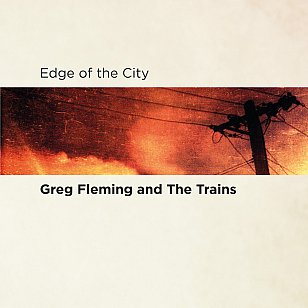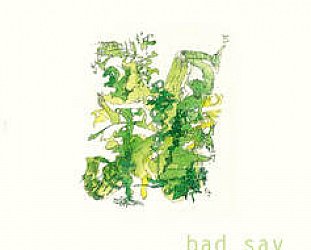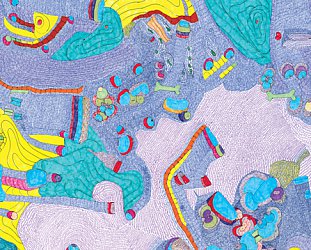Graham Reid | | 3 min read
Greg Fleming and the Trains: More Time

Some albums come with lyrics sheets which you think must be embarrassing for the "songwriter". Not so Aucklander Greg Fleming whose lyrics are so economic that as you listen you can picture the scenarios and characters.
Yet look at the printed words and you realise how refined and crisp they are, and have left huge gaps where you've filled in the faces, places and details.
In Recent Hire here for example the narrator tells of taking on a hard working guy back from Sydney ("his welds were clean and he was never late") but then "it was my daughter Lucille who opened the safe, they caught a plane to Asia someplace" and he notes that she "always liked those outlaw songs". But the narrator also looks at himself and recalls when he was a wild one too, so "Lucille if you hear this, please call your mother or me".
"We love you no matter what, you're still young it's not too late to stop."
And look at how much is left out by way of detail: the outlaw songs (the attraction to the bad boy); your mother or me (are they separated?); if you hear this (the narrator/singer line blurs); we love you no matter what (that love transcends all) . . .
And sung in a broken weary voice, Recent Hire has a rare ring of authenticity.
Fleming's voice conveys his stories with the kind of committment and persuasive power of Paul Kelly and he writes with similar economy on this, his first album of new material in almost two decades.
Here is a someone confronted by an older brother who has slipped sideways through dope into a world where he now talks to God and the Devil (the brother's name is the weighty Elijah); a son moving away from his mother, both feeling regret; a cut man in the fight game who has seen a boxer die but gets drawn back into the only thing he knows; a song where the story of betrayed love in a film and real life intersect; and a country rocker in which the singer tells of working two jobs ("one for the money, one for my sanity"), one being playing in a bar belting out his music . . .
And in that last song he acknowledges there's not going to be a long limousine of fame, but he's got a girl who understands him and "a band that rock".
And the Trains certainly do when required, although on the title track they also show the kind of restraint which the best bands do when the story requires as much space as sound.
That song -- with Fleming on piano -- is a slow ballad which posits the singer as an outsider in his city and life; and on the five-minute opener More Time -- which rings in like classic Tom Petty -- everything cuts right back to nothing as the unplanned party in the first verses takes on a reflective tone for the singer. As with Bob Seger's Night Moves, the silence and space around lines like "I woke up dreamin' once, never slept again, they say daybreak is close, closer than it's ever been" have the emotional impact of a holy moment when time stops and realisation begins.
This is not just clever writing and arrangement, but comes after years of refining lyrics and ideas, and that makes these songs possess a sense of natural effortlessness.
Fleming and the Trains work a rare seam in New Zealand music, one which I suspect has its emotional home and heart in alt.country America or across the Tasman where such scuffed narratives and characters battered by life aren't uncommon in the music of Townes Van Zandt, James McMurtry, Cold Chisel, Midnight Oil and Paul Kelly.
These are literate lyrics married to music which supports and underscores the driving emotions. Rock-noir rendered with poetic allusions to so much more outside of itself. Fill in the spaces yourself.
If Hi Fi Blues and the final song Elevators seem the least of it here, they at least add narrative breadth.
But this one gets it exactly right so often in brushstrokes which let you fill in those gaps . . . and in refined couplets like these in Train on Fire which have been honed to the bone: "I always acted so tough, but couldn't you tell from my touch? That I loved you yes, and I'm here to confess. And I'm climbing the stairs but the smoke doesn't clear . . ."
Past tense there you note, the smoke and fire reality/metaphor . . .
Like the sound of this? Then check out this.







Andrew B. White - Aug 28, 2012
NB: The album (CD) is in stores Friday August 31st and iTunes the following week.
Savepost a comment